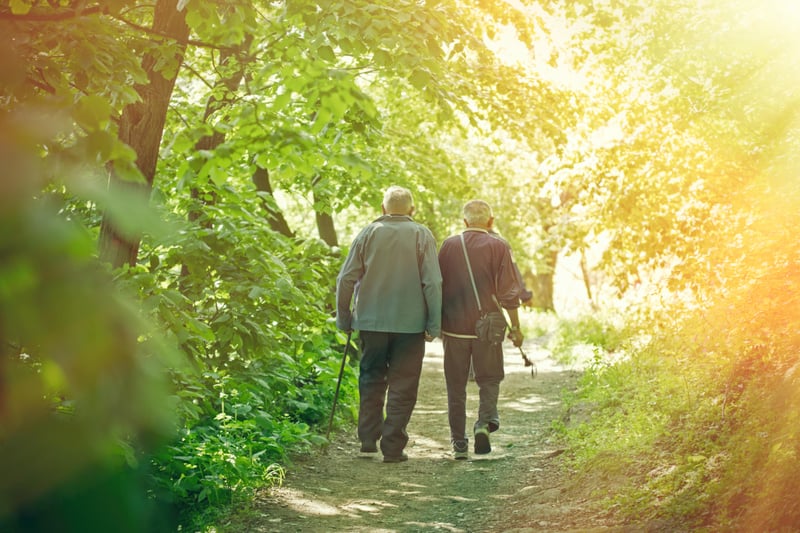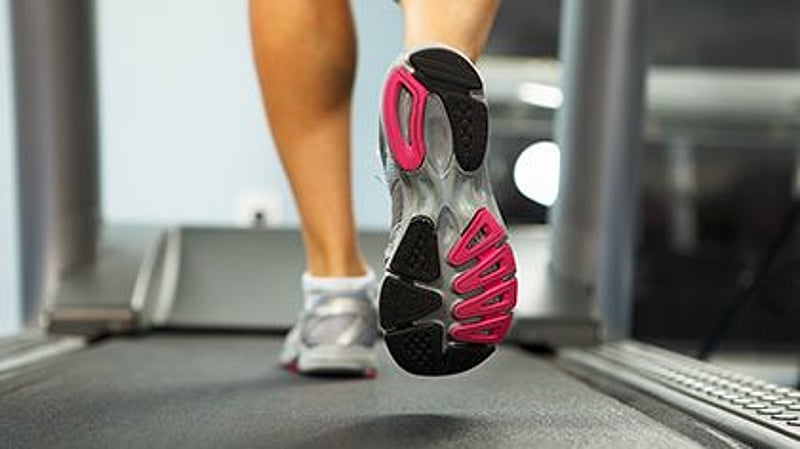Get Healthy!
71 Results for search "Exercise: Walking".
Health News Results - 71
Writer Jenny Block and her chiweenie, Aurora, are on a health kick.
"We walk at least 1 mile and up to 4 miles in the early morning, before it gets too hot," said the Houston-based author.
"She needs it, and I need it, so it works out great," said Block, who has shed...
- HealthDay Reporter
- Denise Mann
- |
- August 25, 2022
- |
- Full Page
It's never too late to benefit from regular walks.
A new study suggests that a 10-minute daily stroll can prolong life in folks well into their 80s and beyond.
"Adults are less likely to meet activity recommendations as they get older,"said study author Dr. Moo-Nyun Jin of Inje University Sanggye Paik Hospital in Seoul, South Korea. "Our study suggests that walking at least one hour...
- HealthDay Reporter
- Cara Murez
- |
- August 25, 2022
- |
- Full Page
That phrase "no pain, no gain" might truly apply to people with peripheral artery disease (PAD), a new study finds.
Researchers found that people with PAD who walked at pace that caused discomfort or even pain improved their walking ability.
"Exercise that induces leg pain is beneficial, though difficult," said senior author Dr. Mary McDermott, a professor at Northwestern University...
- HealthDay Reporter
- Cara Murez
- |
- July 27, 2022
- |
- Full Page
While chronic stress is a key risk factor for heart disease and stroke, most cat and dog owners say pets help them chill out and stay active.
A new American Heart Association (AHA) survey of 1,000 pet owners found 95% relying on their animal companions for stress relief. About 7 in 10 said they'd rather spend time with their pet than watch television, and nearly half (47%) said their pets...
- HealthDay Reporter
- Cara Murez
- |
- June 21, 2022
- |
- Full Page
When the world gets you down, go for a walk and make your heart happy.
Physical activity is one of the best ways to manage stress and boost your mood, while reducing your risk for
America's roads are getting ever more dangerous for pedestrians, a new study finds.
During the first six months of 2021, there was a 17% increase in pedestrian deaths in the United States - and that just continues the sharp increase seen over the previous 10 years, the researchers noted.
- HealthDay Reporter
- Robert Preidt
- |
- April 7, 2022
- |
- Full Page
Want to preserve all those precious memories, including your first kiss and how you felt the first time you got behind the wheel of a car?
If you do, start moving: New research shows that when sedentary older adults started to exercise, they showed improvements in episodic memory, or the ability to vividly recall meaningful moments and events.
These benefits were most pronounced amo...
- HealthDay Reporter
- |
- February 21, 2022
- |
- Full Page
Four in 10 Americans say they've had at least one heart-related issue during the COVID-19 pandemic, and about one in four who have tested positive say COVID has affected their heart health, according to a new online poll.
Shortness of breath (18%), dizziness (15%), higher blood pressure (15%) and chest pain (13%) were the top problems reported in the survey of 1,000 American adults.
<...- HealthDay Reporter
- Robert Preidt
- |
- February 2, 2022
- |
- Full Page
Tempted to take your workout into the great outdoors?
Be aware that there are both benefits and risks to exercising outdoors during the winter.
"There's actually some advantages to working out in cold weather -- with no heat and humidity to deal with you may be a...
- HealthDay Reporter
- |
- January 30, 2022
- |
- Full Page
Americans, get up out of that chair and get moving.
If everyone between 40 and 85 years of age were active just 10 minutes more a day, it could save more than 110,000 U.S. lives a year, a large study reports.
"Our projections are based on an additional 10 minutes of moderate to vi...
- HealthDay Reporter
- Steven Reinberg
- |
- January 25, 2022
- |
- Full Page
When older people cut back on physical activity, their risk of type 2 diabetes rises. But walking regularly can help, a new study suggests.
The more steps you take -- and the more intensely you walk -- the lower your odds for type 2 diabetes, researchers found.
To assess the link between walking and diabetes risk...
- HealthDay Reporter
- Robert Preidt
- |
- January 25, 2022
- |
- Full Page
A few hours of exercise a week may help slow Parkinson's disease, even if it's just moderate activity such as walking or gardening, a new study suggests.
The key is to be consistent, the researchers found.
"Although medications can provide people with Parkinson's some symptom relief, they haven't been shown to slow the progression of the disease," said study author Dr. Kazuto Tsukit...
- HealthDay Reporter
- Robert Preidt
- |
- January 13, 2022
- |
- Full Page
Contrary to long-held wisdom, teen athletes recover from concussions sooner if they do light aerobic exercise rather than resting in a dark room, new research suggests.
Instead of so-called "cocoon therapy," new research-supported therapy has young concussion patients getting out of bed and doing protected exercise earlier.
"What the research found was that adolescents were having a...
- HealthDay Reporter
- |
- November 14, 2021
- |
- Full Page
Call it the great pandemic sit-down.
As COVID-19 turned daily commutes into shuffles between rooms at home, and Netflix replaced time spent at the gym or playing sports, Americans have been sitting a lot more. Now a new study suggests it may be putting their mental health at risk.
"We knew COVID was going to affect our behavior and what we could do in lots of weird, funky ways that ...
- HealthDay Reporter
- Robert Preidt
- |
- November 11, 2021
- |
- Full Page
Children who spent more time in nature during pandemic lockdowns suffered fewer behavioral and emotional problems, British researchers say.
The investigators also found that children in wealthier families tended to increase their connection to nature during the pandemic more than those from poorer families.
The new study included 376 families in the United Kingdom who had children a...
- HealthDay Reporter
- Robert Preidt
- |
- October 15, 2021
- |
- Full Page
Many American arthritis sufferers aren't getting any exercise despite its benefits for reducing pain and improving their quality of life, new research shows.
Sixty-seven percent of U.S. adults with arthritis engaged in physical activity in the past month, most often walking, according to a new data analysis ...
- HealthDay Reporter
- Steven Reinberg
- |
- October 14, 2021
- |
- Full Page
It's not just athletes on the field who suffer when outdoor temperatures get too high. Members of college and high school marching bands are at increased risk of heat-related illness, too, researchers warn.
"They go out there, and they often wear these really heavy wool uniforms," said lead author Andrew Grundstein of the University of Georgia. "They practice many times for hours and hour...
- HealthDay Reporter
- Steven Reinberg
- |
- September 20, 2021
- |
- Full Page
Movement can be very difficult for people with Parkinson's disease, as shaking and stiffness play havoc with balance, coordination and gait.
There are many different tricks Parkinson's patients can use to improve their walking and avoid injury from a bad tumble -- but a new study reveals that people often have to figure them out on their own, with no help from either a doctor or physical ...
- HealthDay Reporter
- Dennis Thompson
- |
- September 16, 2021
- |
- Full Page
Miami publicist Robin Diamond is "step-obsessed."
She aims for 10,000-plus steps every day using her Apple watch and even bought a treadmill during the COVID-19 quarantine to make sure she reaches her daily goal. The 43-year-old has lost 15 pounds since April 2019 and feels better than ever before.
"Walking saved my sanity and restored my body," she said.
Now, a new study sugg...
- HealthDay Reporter
- Denise Mann
- |
- September 3, 2021
- |
- Full Page
Take a work break: A small, new study suggests that getting out of your chair every half hour may help improve your blood sugar levels and your overall health.
Every hour spent sitting or lying down increases the risk for metabolic syndrome and type 2 diabetes, the study authors said. But moving around during those sedentary hours is an easy way to improve insulin sensitivity and reduce t...
- HealthDay Reporter
- Steven Reinberg
- |
- August 16, 2021
- |
- Full Page
After a stroke, survivors can greatly increase their odds for many more years of life through activities as easy as a half-hour's stroll each day, new research shows.
The nearly five-year-long Canadian study found that stroke survivors who walked or gardened at least three to four hours a week (about 30 minutes a day), cycled at least two to three hours per week, or got an equivalent amou...
- HealthDay Reporter
- Ernie Mundell and Robert Preidt
- |
- August 12, 2021
- |
- Full Page























